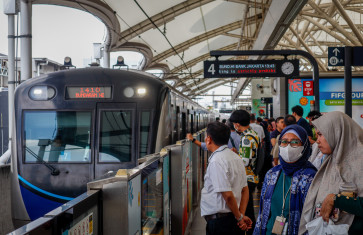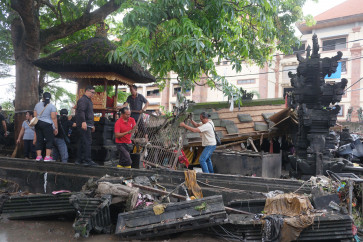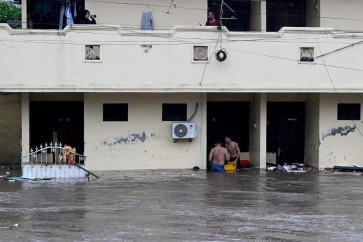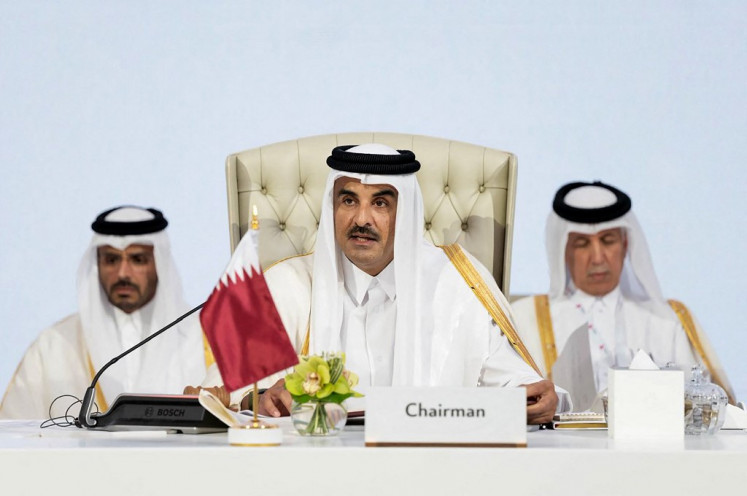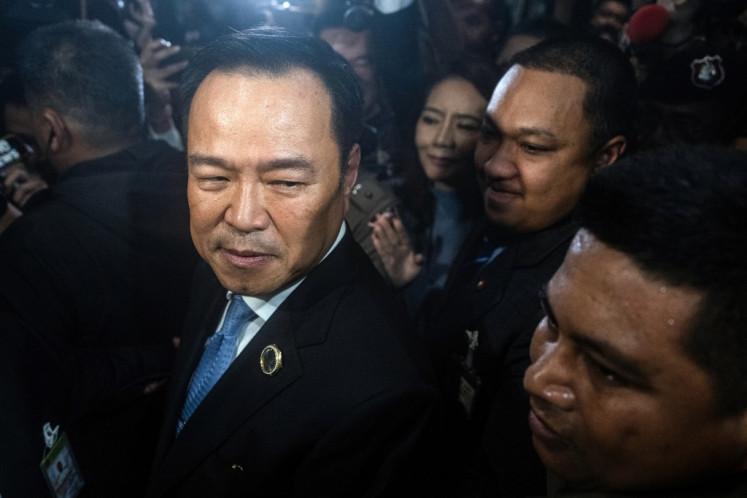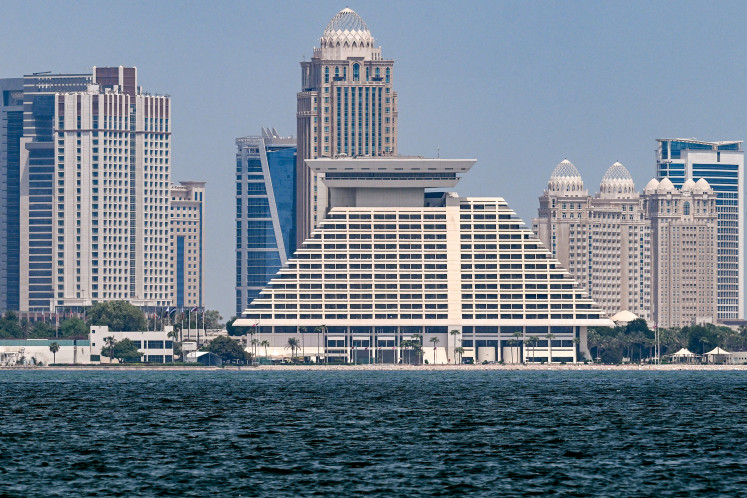Popular Reads
Top Results
Can't find what you're looking for?
View all search resultsPopular Reads
Top Results
Can't find what you're looking for?
View all search resultsBhutan's democracy experiment
Temple: One of the main temples in Paro
Change text size
Gift Premium Articles
to Anyone
T
span class="caption" style="width: 136px;">Temple: One of the main temples in Paro. The country's first national survey on "Gross National Happiness", Bhutan's homegrown index of well-being, found that spirituality ranked No. 13; the top three factors among respondents were financial security, access to roads and education.
Bhutan held a regional conference on deepening democracy from Oct. 11 to 15, in cooperation with the United Nations Development Program and the Center of Bhutan Studies. The Jakarta Post's Ati Nurbaiti was assigned to the event in Paro, a fertile valley in the world's remaining Buddhist kingdom. Continuing reforms started by his grandfather, last year the king unexpectedly abdicated, making Bhutan a constitutional monarchy under the new ruler, his 29-year-old son. The following is a report.
The clang of a devotee turning the prayer wheel at dawn.
Crows swooping into the valley. Dancing archers whooping over a bull's-eye. School children racing past the clear Pho Chu river. And sunrise parting the mist to reveal glistening snowy peaks.
With frightening TV images of wars and violence in foreign lands, residents nesting in Bhutan's part of the Himalayas would naturally want to keep it that way.
"We just want peace," said Tashi Tshering, 42.
Neighboring Nepal doesn't look too peaceful with militants at war with the government; neither does India and China's Tibet just to the north.
From the valley of Paro, the tourist town near the capital here, politics surely look scary to Tshering, a businessman.
"When one party shouts, the others shout; shops must close," he said.
Tshering's wife runs their general store; he drives his car for rent, to supplement their income
Across the town square, a 22-year-old said she enjoyed the experience of last year's elections, when 80 percent of over 630,000 people voted for the first time in the kingdom.
One election seemed traumatic enough for citizens.
Recalling the "divisive" atmosphere, Prime Minister Jigme Yoser Thinley told guests, "We didn't allow celebrations when we won."
His party swept the votes, leaving only two out of 47 seats in parliament to the opposition.
Last year the fourth king, Jigme Singye Wangchuck, abdicated last year, and Bhutanese, though shocked, welcomed their handsome new ruler, the Oxford-educated Jigme Khesar Namgyal Wangchuck. Then citizens had to discuss a draft constitution and prepare for elections.
"A kingdom is easier," said Chhimi Zangmo, a shop employee, carrying her infant girl.
By the next elections, she said, "politicians might be fighting for their own positions."
Aides to the former king say he had discussed with them for years how to avoid to a minimum the worries of other countries - such as conflicts wrought from suppressed discontent, or environmental destruction caused by seemingly hidden but systemic degradation - and how to avoid repeating the widespread mistake of not seeing all those problems until it was too late.
So the decision was not only to shift to a democracy but to have better tools to anticipate problems than more experienced countries.
It was His Majesty, the aides say, who coined Bhutan's now famous term, "Gross National Happiness" (GNH), after challenging his aides to come up with a clearer tool than conventional indices.
"He was a very young man," a current minister said.
And that was before the UN first issued the Human Development Index in 1990.
The UNDP's top man for the Asia Pacific, Ajay Chibber, says Bhutan has significantly reduced poverty.
The kingdom's largely overseas-trained ministers and MPs are challenged on how to measure and achieve the GNH, trying to combine it with conventional indicators like the GDP.
"You can't achieve happiness if you're starving and don't have a home," said Yeshey Zimba, the minister for public works and housing,
He has his work cut out for him. The nation's first GNH survey showed "access to roads" came second to "financial security", in factors that made people happy.
A vegetable vendor in the capital is practical about her own happiness indices:
"I have to work here on the streets to sell her vegetables and apples," said Dolma, 63, through an interpreter.
"But I have no problem, I can sleep, I can eat, I can come here every day."
Unlike in the old days, she no longer has to worry about sending off children to hard labor for the kingdom's projects such as the construction of roads and temples.
Nowadays the young also want to leave - for education. Basic schooling is now mandatory and free; the medium since the 1980s has been English, the result being at least fluent conversational skills in English among children.
The tools for survival of the tiny kingdom is thus evident; a picky selection of what to absorb from the world and what to shun - in terms of environment, culture and trade.
English, for instance, smoothes the path to better paying jobs and the numerous scholarships one can pursue to study abroad. There are no worries about brain drain.
"Ninety-nine percent come back," said the PM, who graduated from Pennsylvania State University in the USA.
Bhutan's official religion, Buddhism, and traditional practices, are the core of its cultural identity. The GNH is part of its modern face, showing the world it wants its own ideas on how to define progress.
Television just came 10 years ago - no MTV allowed - but the Internet is expanding. Tourists have only been allowed since the 1970s.
The tourists who are willing to pay more "are coincidentally sensitive about the culture and the environment," the PM said.
This means holidays to Bhutan are expensive and exclusive, while accession to the WTO is still under careful consideration.
The fortresses of caution remind the visitor of the large gates and remains of fortresses around the main temples dotting the hills, built to prevent invaders in days gone by.
Complaints are being raised against cultural invasion, such as the pros and cons of whether the nation really needed to send a a "Miss Bhutan" to the latest world beauty pageant.
Caution is needed not only against the wild wild West; tiny states are mainly wary of big neighbors eying their luscious resources. In the case of Bhutan, one resource is its source of hydroelectric power from its gushing rivers, which it exports to India.
In a bid to shed some light on a prudent way forward, officials, politicians and scholars here listened intently to lessons on democracy from the East and West in the October regional talks.
The speaker from Thailand showed unsurprising survey results of declining trust in politicians. Experts on elections said no model has proved perfect yet. Indonesia's story was one of much hope and despair.
But people here say they are ready to learn, especially as the handover of government affairs from the king was his own will. Measuring the GNH is "tough", one business journalist said. But when asked if he believed in it, the young man vigorously nodded - "yes!"
An advantage of the new democracy seems to be its enthusiasm to have everyone pitch in and improve policies.
To keep everyone happy, it would do well to avoid mistakes like Indonesia's rulers, where anyone attempting to interpret the state ideology differently faced the threat of jail, not too long ago.
-- PHOTOS BY ATI NURBAITI


